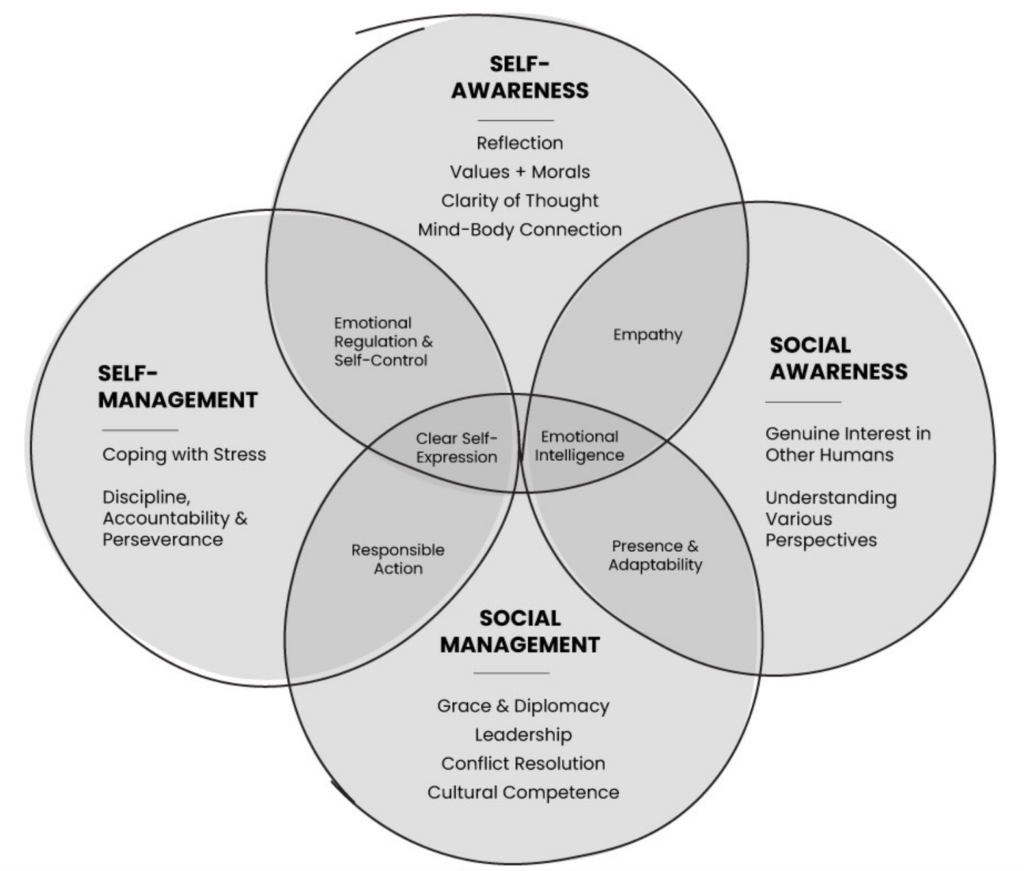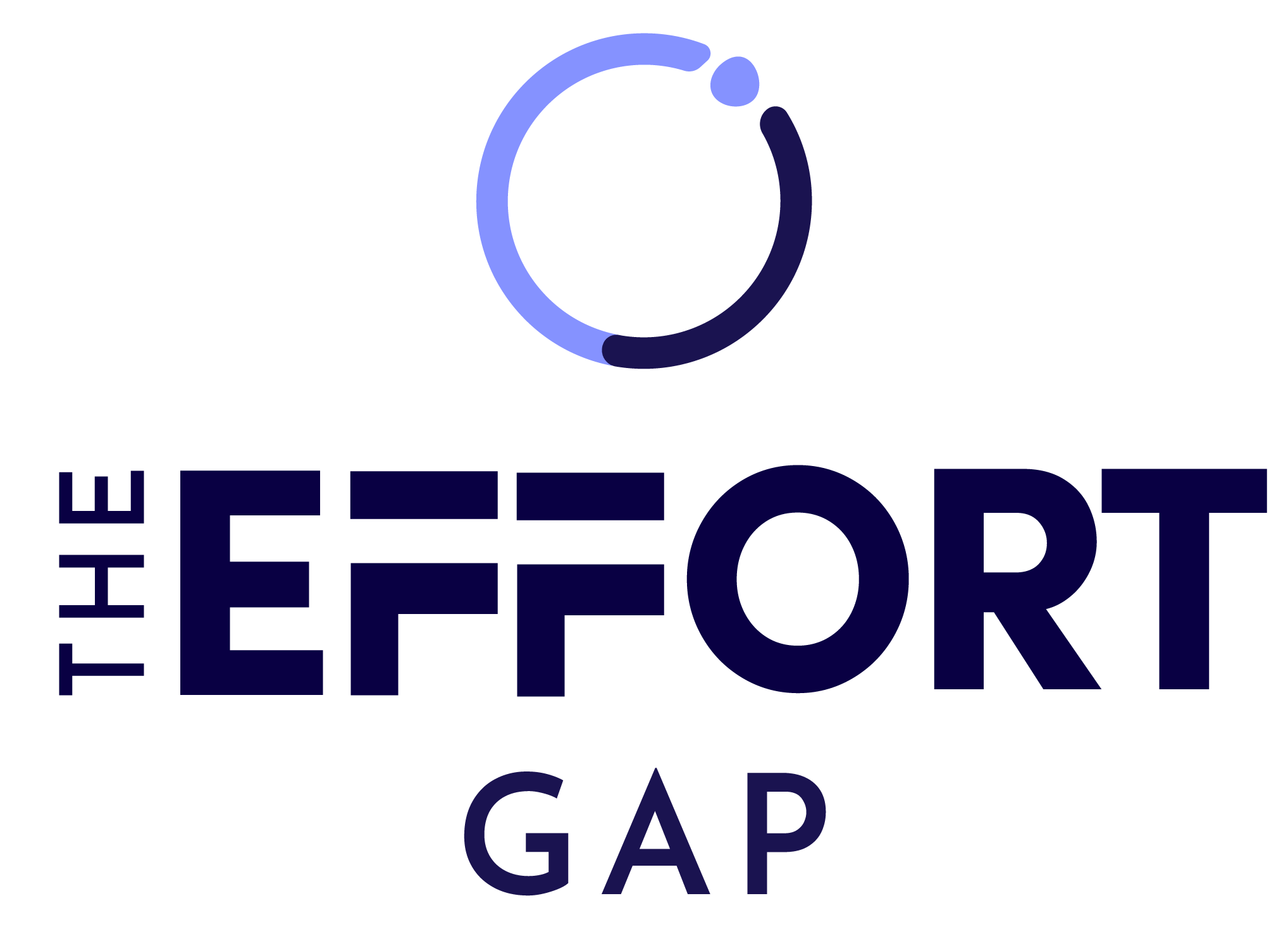Emotional intelligence is at the core of every successful pursuit, whether in business, relationships, or personal growth.
I’ve invested over $10,000 and hundreds of hours into various coaching and training opportunities over the past decade. My experiences ranged from public speaking, business management, fundraising, marketing communications, and leadership. Each experience, despite differences in industry and subject matter, follows the same criteria for success.
It turns out that success in any endeavor roots into the four quadrants of emotional intelligence:
-
- Self-Awareness (Understand Yourself)
- Social Awareness (Understand Others)
- Self-Management (Lead Yourself)
- Relationship Management (Manage Relationships)
Leading balanced lives requires skills derived from each quadrant. This is a roadmap for assessing your current strengths and charting a path for growth.

This adaptation intentionally presents intrinsic circles. Developing emotional intelligence is not a lateral or chronological process. There is connectivity between all four quadrants, as well as the skills within them.
Self-Awareness: Know Yourself
What It Means to Truly Know Yourself
When completely free from external influences, distractions, and cognitive biases, who are you?
Self-awareness involves more than just understanding your emotions; it also means recognizing the feelings they create, the narratives you attach to them, and the underlying messages they are trying to convey.
Self-Awareness as the Gateway (not THE way) to Growth and Emotional Intelligence
Even the best self-help books place a disproportionate emphasis on the self. While understanding yourself is essential, growth and fulfillment don’t come from introspection alone.
Self-awareness without action and connection has you isolated in an echo chamber of your own thoughts. Left there too long, self awareness stagnates, or even starts drifting in the wrong direction. Because relationships are where you test what you’ve learned, expose your blind spots, and expand your self-understanding.
Personal growth isn’t about you. This is about becoming a better version of yourself in the context of relationships and community. Beyond the solitary development of self-awareness, to truly grow is to embrace a cycle of introspection and effort, empowering you to:
- Consider what you discover about yourself to gain a deeper understanding of other humans.
- Use self-awareness to guide your attitude, behavior, and decision-making.
-
Decipher external stressors from personal shortcomings or relational challenge
-
Understand your fears, aspirations, limitations, and values. Then, communicate plainly in those terms.
When you develop self-awareness, you articulate your emotions, reactions, habits, aspirations, and limitations. You can leverage that awareness to understand how your behavior affects others. Without insights gleaned from self-awareness, you can’t be effective at self leadership, which involves taking care of your needs, communicating clearly, and making responsible decisions.
Self-Management: Lead Yourself
Handling Emotions Responsibly
There is power in maintaining self-control through heavy emotions, remaining calm in high-stakes situations, and gracefully moving through difficulty. That is self leadership in action.
Some call it “getting your shit together.” We often perceive people who “have it together” as fearless and confident. But self leadership and emotional intelligence require no such superhuman traits. People who “have it together” don’t have natural talent. They are exhibiting learnable skills.
Self leadership is the ability to handle your emotions and reactions responsibly in any situation. The skills of self leadership include adapting to change, managing stress without causing harm, and making a disciplined effort even when motivation wanes.
Cultivating Growth and Emotional Intelligence in the Face of Discomfort
Lacking self leadership and emotional intelligence makes it hard to get shit done. When we’re not getting shit done, a common response is that we must lack motivation. But the quest for motivation is a myth.
There’s a common misconception that dopamine is a reward chemical released the moment we achieve what we want. Dopamine (often experienced as feeling “motivated”) is generated through the process of pursuing a goal. It actually diminishes after the goal is achieved (now what?).
So if you rely on being happy after you get what you want, you will perpetually be disappointed. Don’t wait for motivation. Because achievement results from discipline and consistency. Instead of aspiring to feel happy all the time, practice contentment with the present moment.
Social Awareness: Understand Others
The Unseen Work of Social Awareness in Peaceful Spaces
People skilled at social awareness and emotional intelligence have a knack for sidestepping conflict because they sense rising tensions or shifting emotions, and can tactfully reorient to maintain a calm environment.
This isn’t about avoiding conflict. Rather, socially aware humans have a keen understanding of human behavior, which allows them to navigate social dynamics with a harmonious finesse. Peaceful spaces are often perceived as a mystery of fate. As if socially-aware people somehow “attract” peace into their lives. This false perception discredits the intuitive wisdom and emotional intelligence skillfully nurtured by socially-aware humans.
The Key to Growth and Emotional Intelligence: Listening Beyond Words
Social awareness and emotional intelligence take active listening and the ability to see things from a variety of perspectives and possibilities. Being a good listener is not just about hearing people’s words. After all, words only account for about 20% of how we understand each other. Socially aware people are skilled at grasping unspoken sentiments. An attentiveness to nonverbal cues, tone of voice, and group dynamics allows opportunities to adapt behavior and communication style accordingly.
This is not a practice of changing who you are or compromising your authenticity. It’s a way to express yourself while being considerate of other people’s experiences and circumstances. You are still the same person, but your delivery shifts in a way that meets people where they are.
By maintaining your authenticity while being adaptive in your delivery, you model thoughtful consideration and emotional intelligence.
Relationship Management: Manage Relationships
Balancing Boundaries and Effort in Relationships
Managing relationships and setting boundaries is not about controlling other people’s behavior. Rather, it’s a communication of how you will respond to their behavior.
For example, “stop yelling” is not a boundary, it’s a command.
“If you continue to yell, I am going to leave” is a boundary.
On the flip side of struggling to set boundaries, there’s the case of the “boundary warrior.” Their behavior suggests a high level of self-awareness, as they have no issue communicating their needs and boundaries. However, their approach often leads to distance and tension. They don’t put effort into understanding the other person’s experience. This reveals a deficiency in both social awareness and social management. Despite acknowledging the importance of boundaries, they resist when people set boundaries in response to their behavior, viewing it as a challenge to their freedom to behave as they wish.
I moved away from calling this “relationship management” and instead use “human connection.” That’s because other people shouldn’t be managed by us. We should work to understand other people, and manage ourselves and our responses.
Communication and Emotional Intelligence in Difficult Moments
Loving yourself and developing more self-awareness won’t shield you from challenges in relationships. Relationships require effort, compromise, and conversation. Lasting relationships are characterized by humility, a willingness to grow together, and an acknowledgement that conflict is inevitable.
Growth and emotional intelligence isn’t stimulated by a “good vibes only” mindset. Life is challenging. Humans are complex and multifaceted. And relationships require mutual effort.
Shielding ourselves from emotions other than happiness and positivity is delusional. Worse, it obstructs genuine connection.
The ability to handle the full spectrum of human emotion is critical, especially for difficult conversations. When we over-script our responses and focus excessively on our performance, we are perceived as detached and disingenuous. Similarly, approaching conversation without prior reflection produces responses lacking depth or thoughtfulness. Productive dialogue that strikes a balance between structure and presence takes:
- Acknowledging the influence of your emotions (self-awareness)
- Listening with curiosity (social management)
- Regularly reflecting on your reactions, feelings, and interactions (self-awareness)
- Regulating your impulses and choosing intentional responses (self-management)
- Being present in your surroundings, not lost in your thoughts (social awareness)
- Clarifying nonverbal cues rather than overthinking or assuming (self-management)






